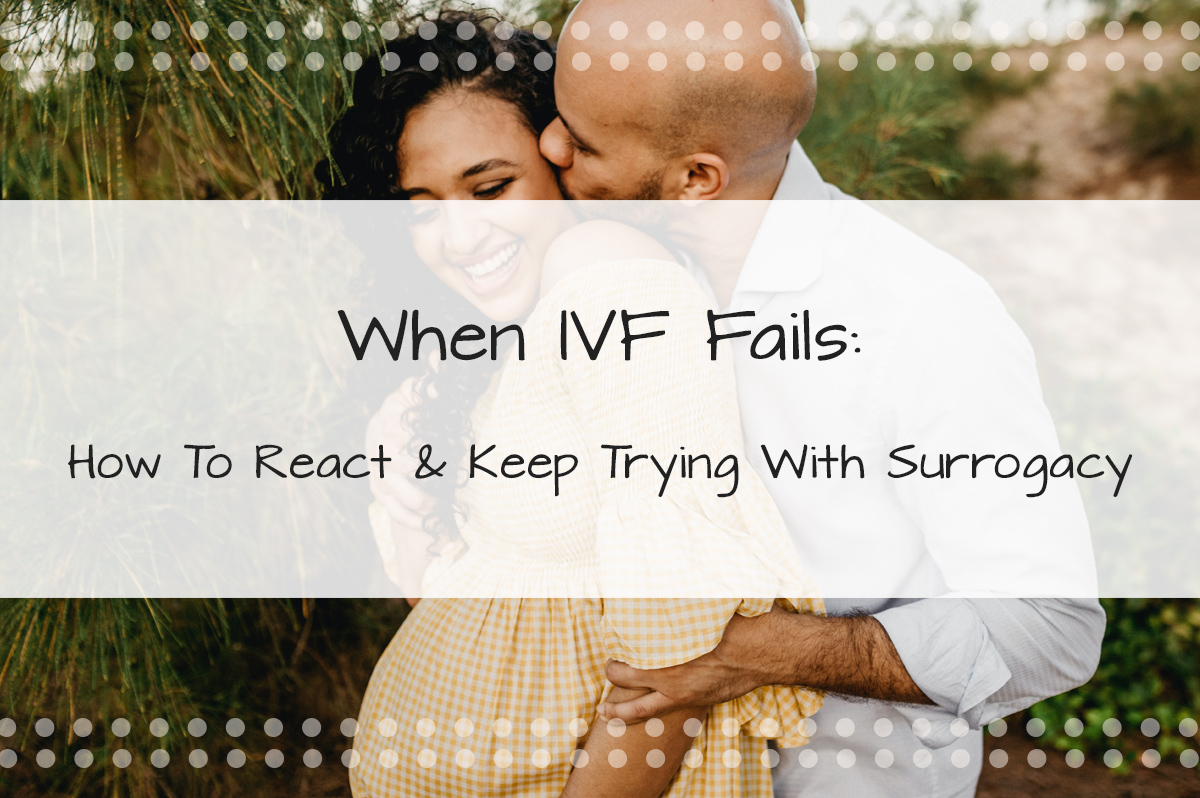
When IVF Fails, How To React, What It Means & How To Keep Trying to Start A Family with Surrogacy
The most vital part of surrogacy is IVF or in-vitro fertilization. After the intended parents find a surrogate, they can start the IVF process, or perhaps before if they are creating embryos. Yet what can intended parents do when IVF fails again and again on their own without a surrogate? How should they react and what should their next step be? This article will shed some light on something as complex as the process of surrogacy.
What is IVF?
First, it’s important to understand what IVF is. IVF, or in-vitro fertilization, is the process used during gestational surrogacy. After a prospective surrogate has decided to become a surrogate and joined a surrogate agency in California, she’ll be matched with parents. The first physical step after all of the paperwork is completed is IVF.
For the parents, they’ll be receiving medications from a fertility clinic to boost their fertility. Because they’re struggling with infertility, these treatments will help boost the rate at which their egg cells and sperm cells are created. In turn, this boosts the number of embryos that can be formed.
After the parents have received their treatments, the fertility clinic will harvest their egg and sperm cells. They’ll be placed in a petri dish where they will combine to form an embryo. In some cases, the specialist may need to insert the sperm cell directly into the egg cell.
Once the embryo is formed, it’s time for the embryo transfer. If the intended parents have already attempted an embryo transfer on their own but know that they need the help of a surrogate mother- chances are the transfer cycles may have failed on their own.
This is when the one who chose to become a surrogate comes into play. They’ll be undergoing fertility treatments as well to regulate her ovulation cycle. The clinic needs to insert the embryo when she is at her most fertile. This increases the chance of the body accepting the embryo.
If all goes smoothly, the embryo will be accepted, and a healthy pregnancy will begin.
Unfortunately, it isn’t always as simple as that. Here are a few reasons why IVF and an embryo transfer might fail.
#1 – Embryo Problems
There are two sites that a fertility specialist will have to examine if IVF fails: The uterus and the embryo. In examining the embryo, it is possible that the embryo was damaged in some way during the IVF process. Since IVF isn’t an exact or perfect science, the process can sometimes damage it in some way. While this is rare, it is always possible.
Sometimes the quality of the embryo, itself, isn’t good enough to survive the process. Genetic defects can decrease the quality of an embryo. This is why genetically testing the embryo before a transfer might be a good idea. It can help specialists determine whether or not the embryo will stand a chance in being transferred.
There may be a genetic defect that keeps the embryo from dividing and growing. In this instance, the body is unable to help it, and so the embryo is rejected.
#2 – Egg Age
Another important factor is the age of the eggs. If you’re a woman past the age of 40 and you’re trying to use your own eggs, it could be incredibly difficult. Every woman is born with a set amount of eggs. Each menstruation cycle loses an egg. By the time a woman is in her 40s, she doesn’t have very many eggs.
Those that she does have may be of poor quality. They may not be healthy enough for an embryo transfer let alone become a healthy pregnancy.
In this instance, it might be a good idea to use the services of an egg donor. You can use the resources from your surrogate agency to help find an egg donor who can provide healthy eggs. It can still be inserted with your partner’s DNA so that the child is part of your family.
Using young eggs increases the chances of the transfer being successful.
#3 – Not Enough Cells Produced
Both parents are given fertility treatments to help boost their fertility. However, if the treatments aren’t successful, the specialist may not be able to harvest very many eggs or sperm cells. As a result, it may be harder to form an embryo. Or the embryo that is formed may not be healthy enough for a transfer.
In this case, the specialist may try different medications to help with infertility.
This can also happen on the side of the surrogate. Even after passing all of the surrogate qualifications and being declared medically ready for treatment, the treatments may still take some time to work.
#4 – Lifestyle Factors
One last reason that IVF might fail is due to lifestyle factors. For those who smoke, for example, it can rapidly decrease your ability to give healthy egg and sperm cells. Drinking can have a negative impact as well. You’ll want to quit both habits before attempting IVF. At the very least, you’ll need to stop three months beforehand.
You’ll also want to watch your weight. Being overweight or underweight can negatively impact reproductive health.
What to Do
If IVF fails, you may wonder what your next steps should be. The best route to take is to try again. Because it IVF and the business of an embryo transfer aren’t an exact science, it can take several attempts before the embryo is successfully transferred. The process of surrogacy can be a long one. Sometimes it can even take up to two years. You need to be prepared to wait that long and give it your all if you want to have a child of your own.
When IVF fails, your fertility specialist will examine the results. This will help them determine the possible reasons behind the failure. With the support of your surrogacy agency, you can try again once they have devised a different treatment plan or analyzed what may have caused the failure. The number of embryo transfers that have failed but also kept going with surrogate mothers (2-3 transfers) far outweigh the number of failed attempts without a good result.
All you can do is keep trying until you finally have a healthy pregnancy with your surrogate from a surrogacy agency. It might just be another transfer that makes the difference.
Egg Donors
Another consideration is to use an egg or sperm donor. If you run out of your own eggs or sperm cells or if they’re not healthy, then it might be a good idea to use an egg donor. Your surrogacy agency can help you find one.
Like surrogate qualifications, egg donors have to pass numerous qualifications before they can donate their eggs. These eggs and sperm cells should be healthy and viable for IVF.
They can also be inserted with your or your partner’s DNA to ensure that the child is still biologically yours.
Stick With It

At our California surrogate agency, we understand how difficult it can be to fail at IVF first as a parent who has tried multiple transfers, and again as an intended parent with a failed surrogate mother transfer.
For many parents, they see it as a wasted potential for life. Try not to be too disheartened. Your chance at being parents could be right around the corner. The first step is to get into contact with our California surrogate agency. We have tons of healthy women who have chosen to become a surrogate to help people just like you, and we have many stories of success after-the-fact of a failed transfer. Sometimes all it takes is another try!
We’re passionate about helping you have a baby of your own and willing to stick with the process until it finally works. You just need to have the patience and endurance to do the same. You can find a surrogate with us and start your journey towards becoming parents.
Even if IVF fails the first or second or multiple times, it never hurts to keep trying. Both your surrogate mother and your surrogacy agency located in Sacramento, California will be here to support you.
